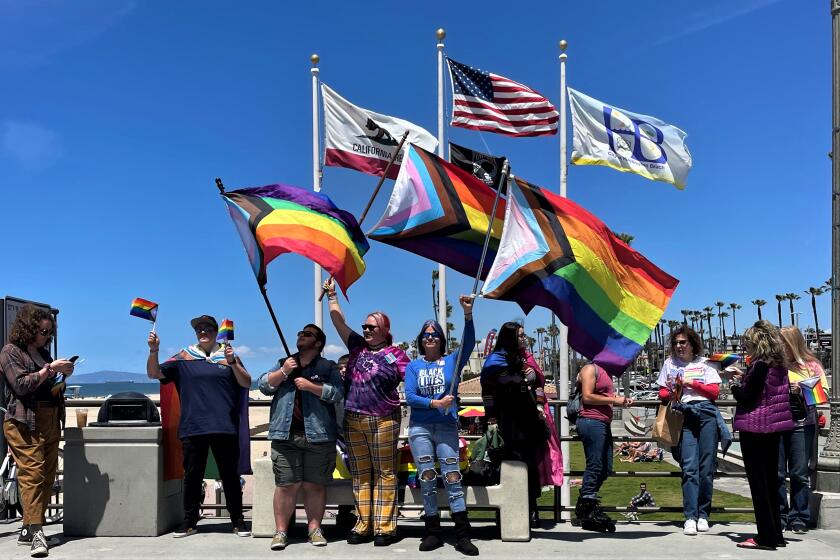Apodaca: No matter what they call it, they’re banning books

During recent travels abroad, I visited some bookstores and libraries. Some might consider it a bit odd to fit such stops into a vacation itinerary, but other book lovers will no doubt relate to my keen interest in exploring repositories of the written word wherever I happen to venture.
Whether their raison d’etre is commercial gain or the common good, these places can be fascinating windows into a locale’s history, culture and people. Some are situated in centuries-old buildings with stories that add to the allure. Yet there’s also the strong pull of universality — there’s nothing quite like the musty-sweet smell that wafts up when a book is cracked open or the quiet thrill of knowing that an entire world lies within its pages.
I know it didn’t make much sense — I could have waited and ordered the books I wanted after returning home or downloaded them to my tablet — but I couldn’t help myself. I bought so many books while traveling that I feared I might exceed my weight limit on the journey home.
Then when I did make it home, that lovely, whimsical, slightly eccentric feeling ran headlong into news that Huntington Beach’s City Council had carried through on some members’ previously stated intention to set up a community parent advisory board tasked with approving children’s books for the city’s public library.
They can cloak this move in whatever euphemistic language they want and issue any denial that suits them, but make no mistake: These council members have initiated an institutional means to ban books that they don’t like.
And rather than protecting children, which they claim as the motivation behind the measure, this looks like little more than a naked attempt to impose a minority’s regressive morality on everyone else. It’s a safe bet that any book that even hints at LGBTQ+ or racial themes and characters will be targeted for censorship.
Ugh. Welcome back to reality.
As previously reported in the Daily Pilot, the Huntington Beach decision was made despite significant opposition, including from three of the seven board members. During a five-hour comment period and in emails to the council, the vast majority of people expressed their disagreement with the measure.
Daily Pilot columnist Patrice Apodaca summarizes the controversial decisions made by the conservative majority of Huntington Beach’s City Council.
Yet it appears that the four members who approved the resolution — Mayor Pro Tem Gracey Van Der Mark, who spearheaded the effort, Mayor Tony Strickland, and Councilmen Casey McKeon and Pat Burns — were hellbent on passing it anyway.
Council members Dan Kalmick, Natalie Moser and Rhonda Bolton voted against the measure.
The advisory board will include up to 21 members — who, unsurprisingly, will be handpicked by the council — and they will have the final say on which new children’s books will be approved. They will also be empowered to remove books currently in the children’s section. Decisions made by a simple majority will be final, meaning they will override the vetting done by experienced, trained library staff.
Of course, the stark reality is that Huntington Beach is far from alone in its repressive policy. Over the past few years, a movement led by well-funded national organizations to restrict access to certain books in school libraries and ban some titles from K-12 curriculum has utilized misleading, hyperbolic rhetoric and bullying tactics to impose its will. In many ways, it has succeeded, as it has had a chilling effect on teachers, school librarians and administrators.
More recently, this effort has widened to include public libraries.
According to the American Library Assn., 2022 saw the largest number of library books challenged since the organization began tracking the data.
This year is on pace to surpass that record. In the first eight months of the year there were nearly 700 attempts to challenge or censor 1,915 library books, a 20% increase over the same period last year, the ALA reported. And those numbers likely represent an undercount.
Most of the books targeted were written by or about people of color or members of the LGBTQ+ community, the association said.
Across the country, the attacks on public libraries have grown increasingly menacing. Many libraries are in danger of having their funding slashed if they don’t accede to demands, and some are at risk of closure. There have been bomb scares. Librarians have been threatened and called groomers and pedophiles.
That’s a long way from the image of the spectacle-wearing, pencil-behind-the-ear bibliophile whose greatest offense was shushing too readily. Sure, that was a mildly insulting stereotype, but given today’s grotesque climate, it conjures feelings of nostalgia and affection. In reality, librarians are skilled professionals who deserve our respect and appreciation.
But many of those who are worried about the dangerous path we’re on aren’t sitting idly by. Efforts to cull books deemed inappropriate by a reactionary minority are motivating others to rise up, organize, mobilize and make their power felt. They are determined to reclaim the narrative and their rights.
So I’ve got some news for the Huntington Beach City Council and all others who champion censorship: Ideas have a way of bursting through the walls built around them. You may have won this round, but in the long run you are doomed to fail.
All the latest on Orange County from Orange County.
Get our free TimesOC newsletter.
You may occasionally receive promotional content from the Daily Pilot.





